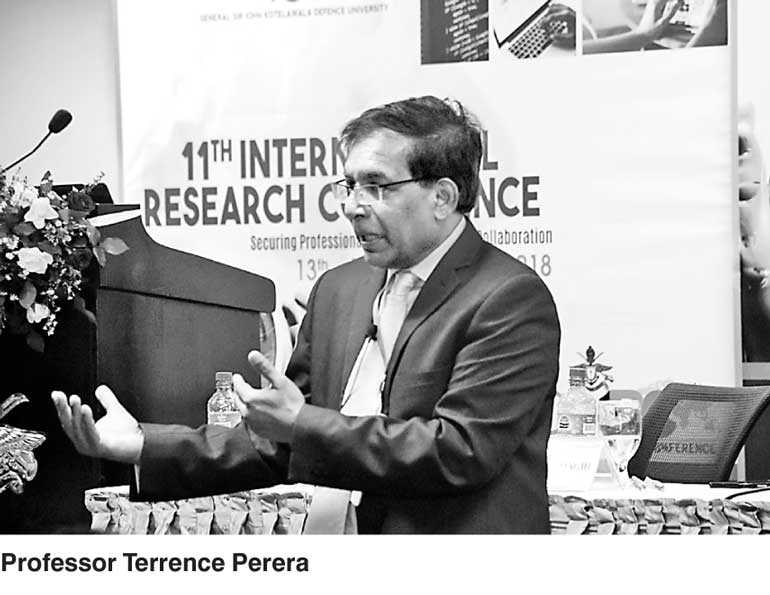Saturday Feb 21, 2026
Saturday Feb 21, 2026
Saturday, 17 November 2018 00:00 - - {{hitsCtrl.values.hits}}

Leading academic, researcher and consultant, Professor Terrence Perera, recently visited Sri Lanka at the invitation of the Sir John Kothalawela Defense University (KDU) to be the keynote speaker at the university’s International Research Conference. Professor Perera also conducted a new technology introduction workshop at MAS Holding, and a research workshop at the University of Sri Jayewardenepura.
Professor Perera of Sheffield Hallam University, UK, boasts a wealth of knowledge and experience in Logistics and Supply Chain Management, Manufacturing Systems Engineering, and Modelling and Simulation. As an active researcher, he has been successful in delivering high-profile research programs in collaboration with industry. His research work focuses on addressing challenges in the deployment of simulation technologies and exploring novel applications for simulation. His current research work includes; developing a simulation enabled framework to enhance the performance of supply chains, developing a simulation based strategy to improve pharmaceutical supply chains and the deployment of simulation in the healthcare sector. Professor Perera is also currently exploring the use of Industry 4.0 beyond the manufacturing sector.
The Professor conducted a total of four sessions that were all centred around Industry 4.0. A concept developed by the German Government, Industry 4.0 is now seen as the answer to the challenge faced by many companies to be more agile and responsive in their functioning, especially where customers are concerned. The concept advocates the use of state-of-the-art digital technologies to create highly flexible systems. Industry 4.0 is considered to be the fourth industrial revolution. At the core, it presents several interconnected digital technologies.
Some technologies are already fairly known, for example Big Data Analytics and Cyber Security. Some are fairly new; Internet of Things (IoT), as an example. These technologies together are expected to make radical changes in industry. The purpose of Industry 4.0 is not to get rid of people, but to develop smart systems where machines and people can work in harmony. Does Sri Lanka need Industry 4.0? The short answer is yes, if its industries wish to remain competitive in global markets.
Naturally, high-tech solutions require significant up-front investment, hence the most sensible approach would be to craft an individual Industry 4.0 journey. Businesses need to identify the most beneficial digital technologies for them first and then have a roadmap to facilitate the gradual introduction of technologies. A national strategy on the use of digital technologies would be extremely beneficial and it will enable businesses to achieve high levels of connectivity. The two-day conference at KDU saw Professor Perera conduct a highly informative session. Although the keynote was focused on the use of Big Data analytics, the professor argued that Industry 4.0 could take current digital transformation projects further forward with many exciting outcomes, for example, smart cities. A visit to the Institute of Technology, University of Moratuwa (ITUM) in Diyagama, provided an opportunity to interact with future technologists who were very keen to learn how Industry 4.0 could be used in engineering applications.
At the University of Sri Jayewardenepura there was an opportunity to network with the industry. At an industry research workshop, the use of digital technologies within the supply chain was discussed. The lecture introduced Industry 4.0 and presented the means by which the concept can be used in supply chain management in order to achieve radical transformations. It was clear that there is a genuine interest to deploy digital technologies, but lack of awareness was seen as a major drawback. A special workshop at MAS Holding, the largest garment manufacturer in Sri Lanka, focused on the use of simulation technologies and other digital technologies.